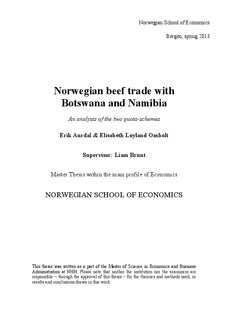Norwegian beef trade with Botswana and Namibia : an analysis of the two quota-schemes
Master thesis
Permanent lenke
http://hdl.handle.net/11250/170034Utgivelsesdato
2013Metadata
Vis full innførselSamlinger
- Master Thesis [4372]
Sammendrag
We examine the Norwegian preferential beef import from Botswana and Namibia, which is administered under two different quota-schemes. The General System of Preferences (GSP) quota of 2,700 tons is allocated to Norwegian importers on a first-come, first-served (FCFS) basis and the EFTA/SACU quota of 500 tons is allocated through an auction. In addition, the quotas are administered through firm-specific allocations within Botswana and Namibia. We investigate which stakeholders benefit from the way the two quotas are allocated by analyzing price data collected from different levels of the value chain. Our main findings are that the exporting and importing firms benefit most from the trade, and that the specific quota allocation method impacts whether exporters or importers have the most bargaining power. We also find evidence that the Norwegian government obtains some profits. Finally, we argue that the preferential beef trade is justifiable in the light of Norwegian development objectives. However, there is a potential risk that the exporters seem to become too dependent on the Norwegian preferential trade.
